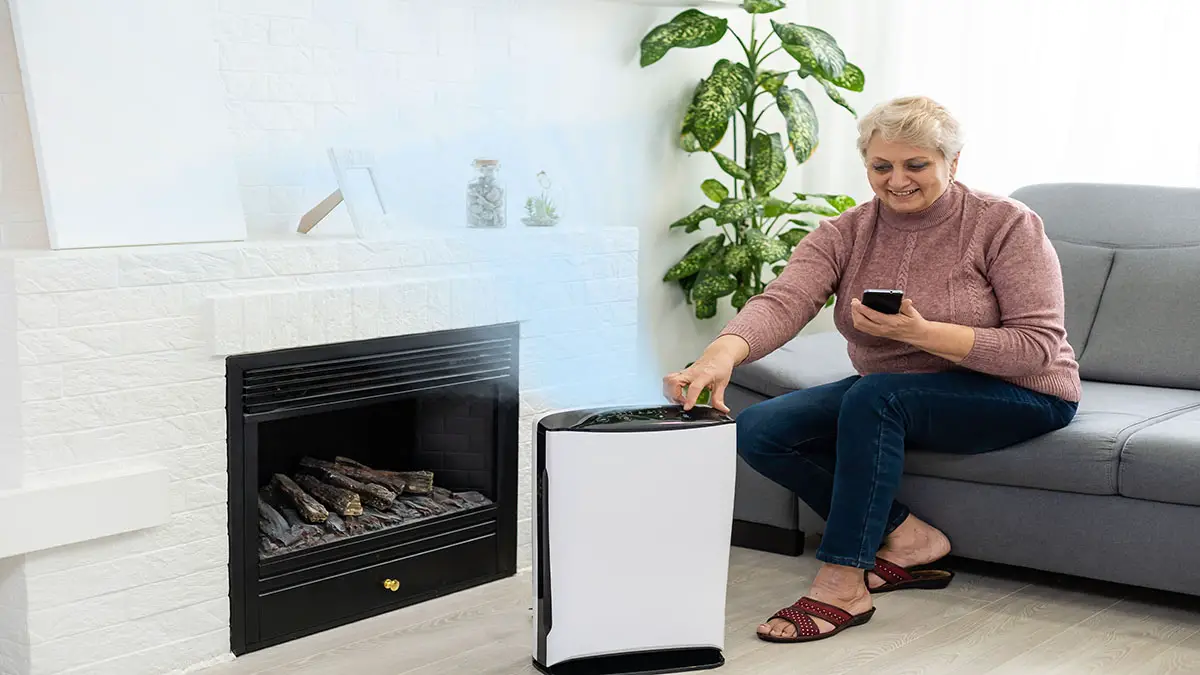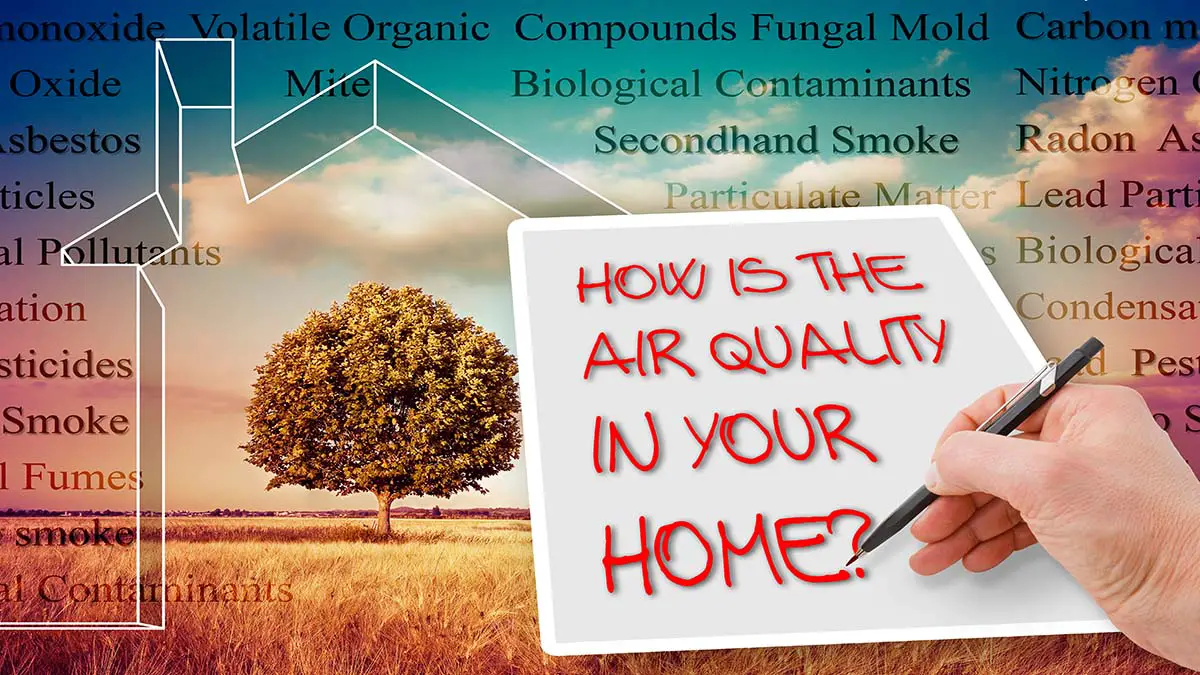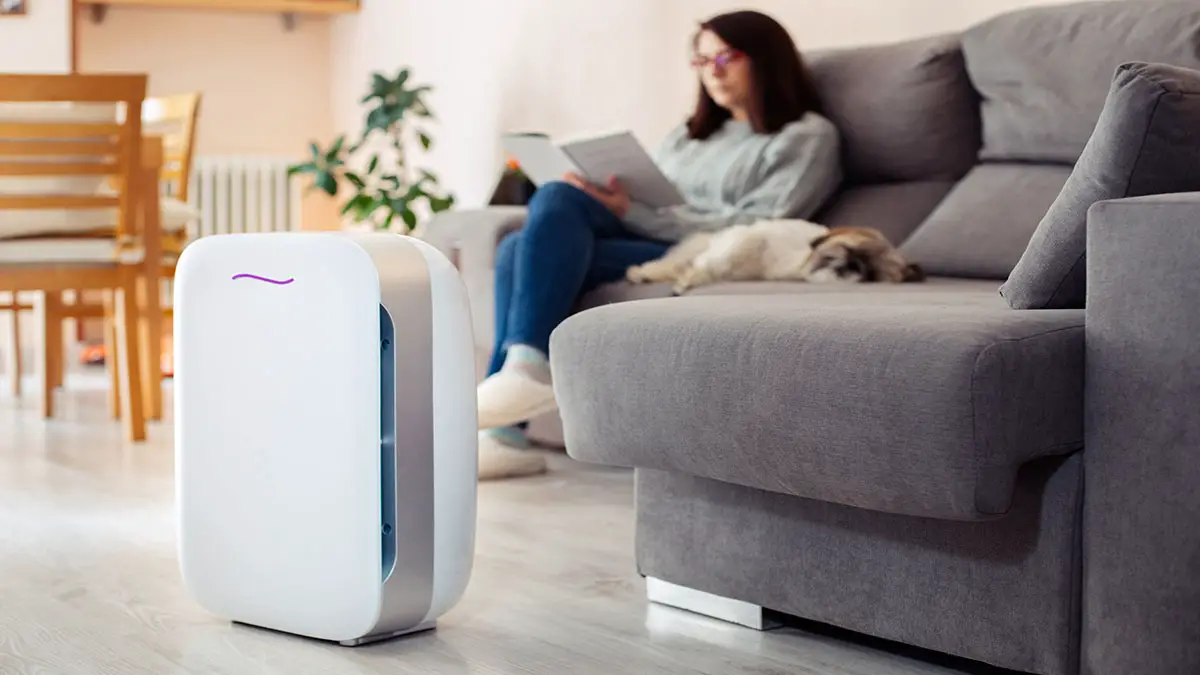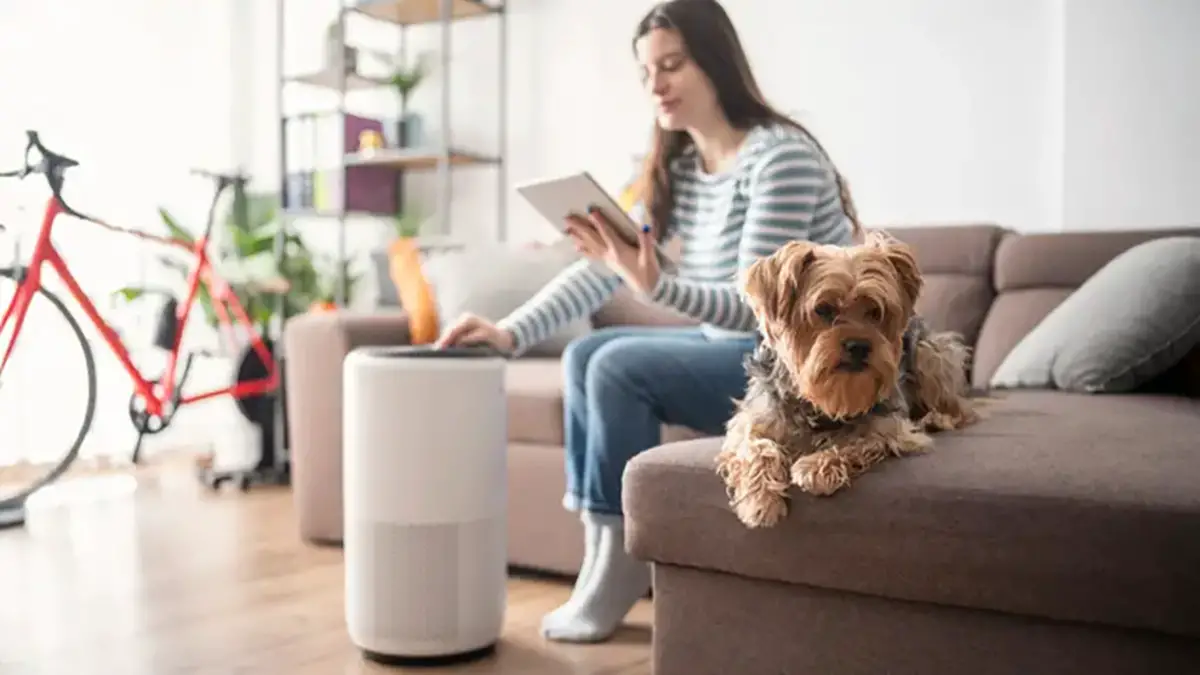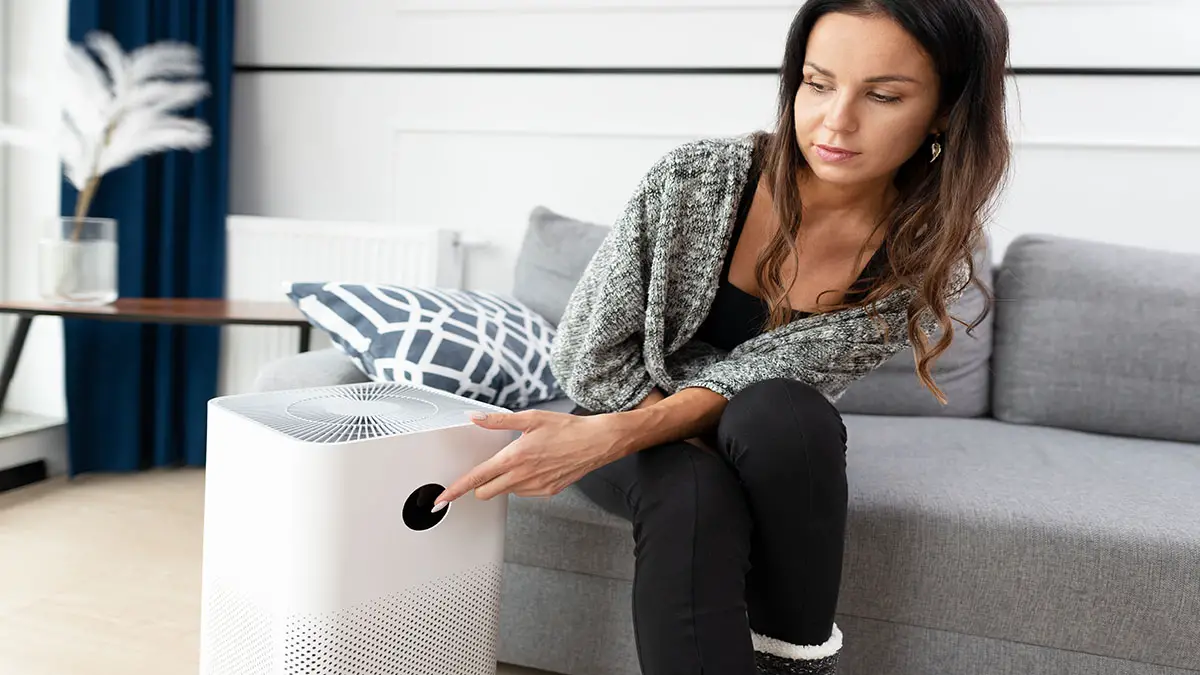Investing in a HEPA filter is a great way to improve indoor air quality. HEPA filters are designed to capture tiny particles that can cause respiratory problems, such as dust, pollen, and pet dander. But how long does a HEPA filter last before needing to be replaced?
A HEPA filter can last about 6 to 12 months, depending on a few factors. If left unused, a HEPA filter could last anywhere from two to ten years, according to Gadget Review. Once you put the filter to use in an air purifier, vacuum cleaner, or other device, the filter’s lifespan will decrease significantly. 1
To ensure your HEPA filter is working effectively, it’s crucial to replace it regularly. House and Home Online recommends replacing HEPA filters every six to twelve months. The lifespan of a HEPA filter is also influenced by usage and environmental conditions, so cleaning the filter with a vacuum and minimizing use can help extend its lifespan.
Read more about the Best Air Purifiers & Reviews.
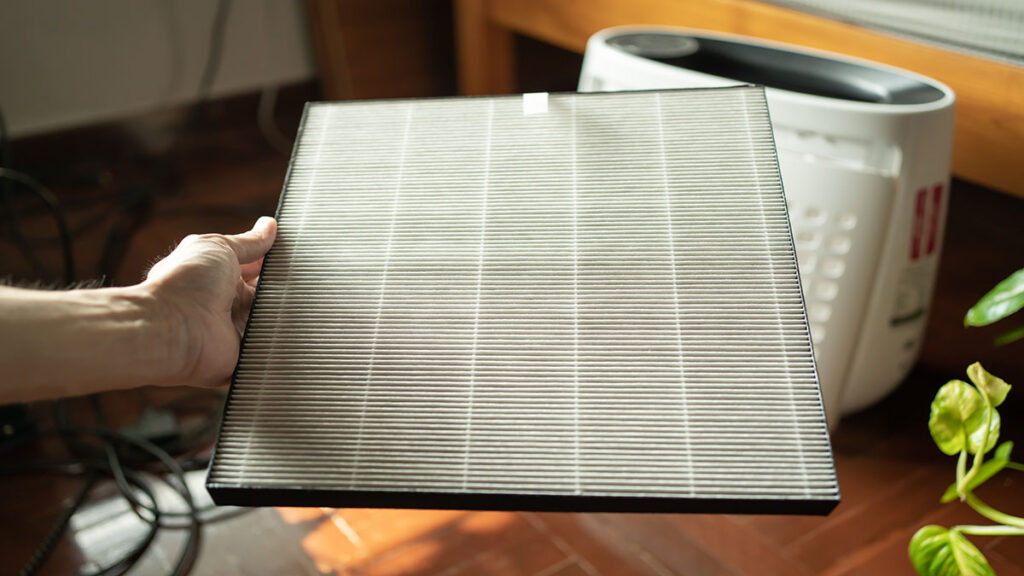
Understanding HEPA Filters
A HEPA filter is the way to go if you’re looking for an air filter that can remove the smallest particles from the air. HEPA stands for High-Efficiency Particulate Air, a type of air filter designed to capture 99.97% of particles that are 0.3 microns or larger.
To put that into perspective, human hair is about 100 microns in diameter so a HEPA filter can capture particles 300 times smaller than human hair!
HEPA filters comprise a mat of randomly arranged fibers that create a maze-like structure. As air passes through the filter, particles are trapped in the fibers, allowing clean air to pass through. HEPA filters are commonly used in air purifiers, vacuums, and other devices that require high-quality air filtration.
HEPA filters are not all created equal, and different classes of HEPA filters are designed for different purposes.
The most common type of HEPA filter is a True HEPA filter, the standard for air purifiers.
True HEPA filters are tested and certified to remove 99.97% of particles that are 0.3 microns or larger.
It’s important to note that HEPA filters have a lifespan and must be replaced periodically to maintain effectiveness. The lifespan of a HEPA filter depends on factors such as usage and environmental conditions.
HEPA filters typically last up to ten years if unused. When in use, they should be replaced every six to twelve months. 2
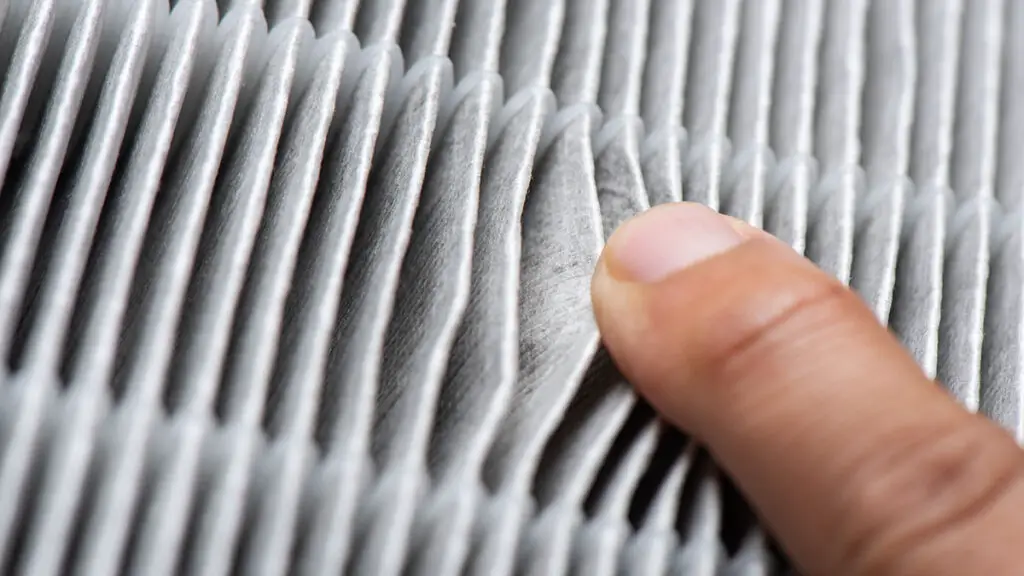
How Long Does a HEPA Filter Last?
Regarding your HEPA filter, knowing how long it will last is important. The lifespan of your HEPA filter can depend on various factors, such as usage, environmental conditions, and the quality of the filter. HEPA filters can generally last anywhere from six months to ten years, depending on these factors.
If you use your HEPA filter frequently, you may need to replace it more often. On the other hand, if you only use it occasionally, then your filter may last longer. Replacing your HEPA filter at least once a year is recommended, even if you don’t use it often.
You can also extend the lifespan of your HEPA filter by taking proper care of it. Regular cleaning of your filter can help prolong its life span. You can clean your filter by vacuuming it or washing it with water. Check the manufacturer’s instructions before cleaning your filter.
Another way to extend the life of your HEPA filter is to use pre-filters. Pre-filters are designed to capture larger particles before they reach the HEPA filter, reducing the workload on the HEPA filter. This can help your HEPA filter last longer.
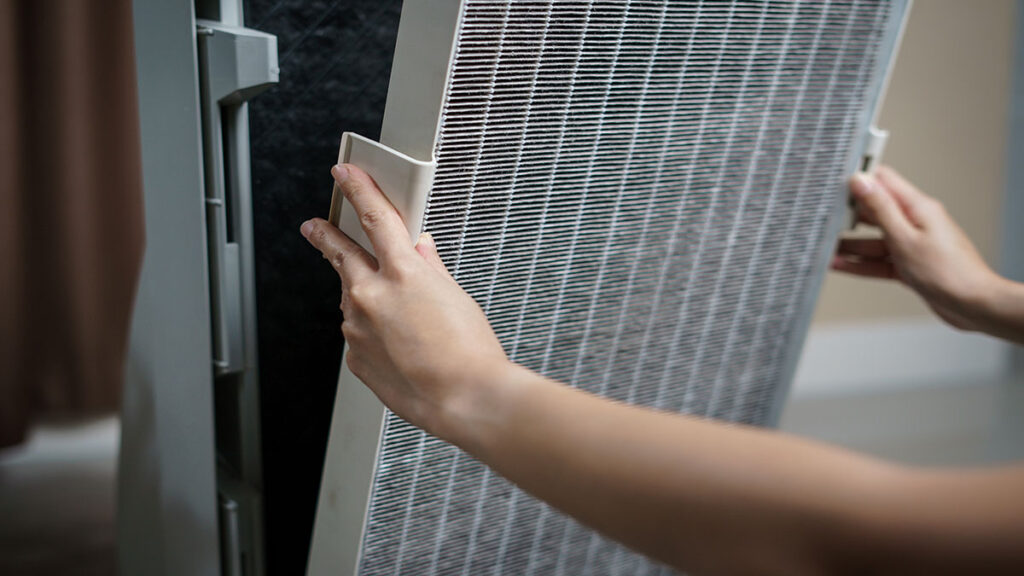
Factors Influencing Hepa Filter Longevity
HEPA filters are known for their exceptional air purification capabilities. The lifespan of a HEPA filter can vary depending on several factors.
Quality of Air
The air quality in your environment is one of the primary factors that can influence the lifespan of your HEPA filter. If you live in an area with high levels of air pollution, your filter may become clogged more quickly, reducing its effectiveness and shortening its lifespan.
If you have pets in your home, the filter may need to be replaced more frequently due to the increased amount of pet dander and hair in the air.
Usage Frequency
The frequency of use is another factor that can impact the lifespan of your HEPA filter. If you use your air purifier constantly, the filter may need to be replaced more frequently than if it is only used occasionally. Similarly, if you use your air purifier in a room with high air pollution or allergens, the filter may need to be replaced more frequently.
Filter Quality
The quality of the HEPA filter itself can also impact its lifespan. Higher-quality filters are often more durable and can last longer than lower-quality filters. Choosing a filter designed for your specific air purifier model and purchasing filters from a reputable manufacturer is essential.
Maintenance Practices
Proper maintenance practices can also impact the lifespan of your HEPA filter. Regularly cleaning your air purifier and replacing the pre-filter can help reduce the amount of debris that reaches the HEPA filter, which can help extend its lifespan.
Following the manufacturer’s recommended replacement schedule and changing the filter when necessary can help ensure your air purifier operates at peak efficiency.
Read more: How to Clean Air Purifier Filter
Signs of HEPA Filter Replacement
HEPA filters are designed to capture tiny particles and pollutants from the air. Over time, these filters will become clogged with the collected particles, reducing their effectiveness. It is important to replace your HEPA filter when it’s no longer working at peak efficiency. Here are some signs that it’s time to replace your HEPA filter:
Reduced Airflow
One of the most obvious signs that your HEPA filter needs to be replaced is reduced airflow. If you notice that your air purifier isn’t blowing out as much air as it used to, it’s likely that the filter is clogged and needs to be replaced.
Unpleasant Odors
If you notice an unpleasant smell coming from your air purifier, it could be a sign that replacing your HEPA filter is time. This smell is caused by the buildup of pollutants trapped in the filter. When the filter becomes saturated, it can no longer effectively remove contaminants from the air, leading to unpleasant odors.
Visible Dirt and Debris
If you can see dirt and debris on the surface of your HEPA filter, it’s a sign that it’s time to replace it. HEPA filters are designed to capture tiny particles, so if you can see visible dirt and debris on the filter, it’s no longer working effectively.
Manufacturer’s Recommendations
Most manufacturers recommend replacing the filter every six months to two years, depending on usage and the level of pollutants in the air. If you’re unsure when to replace your filter, check the manufacturer’s instructions or contact customer support for guidance.
Remember, replacing your HEPA filter regularly is essential for maintaining good air quality in your home. By watching for these signs, you can ensure your air purifier always works at peak efficiency.
Read more: Best Place to Put An Air Purifier
Proper Maintenance of HEPA Filters
Proper maintenance of your HEPA filter is essential to ensure it lasts as long as possible and continues to function effectively. Here are some tips on how to maintain your HEPA filter:
- Regular cleaning: Regular cleaning of your HEPA filter can significantly extend its lifespan. Use a small vacuum or dust-buster to remove excess dust from your filter before wetting it with water. Once you remove the thickest dust, a light hand wash will remove smaller bits of dust and grime from the pre-filter. Make sure to follow the manufacturer’s instructions for cleaning your filter.
- Replace pre-filters: Pre-filters can help extend the life of your HEPA filter by trapping larger particles before they reach the HEPA filter. Replace your pre-filter every three months or when it becomes visibly dirty.
- Proper placement: Proper placement of your HEPA filter can also help extend its lifespan. Keep your filter away from heat sources, such as radiators or sunlight, as this can damage the filter and reduce effectiveness.
- Usage frequency and environment: The lifespan of a HEPA filter is influenced by usage and environmental conditions. Filters should be replaced every six to twelve months when in use. If you live in an area with high pollution or use your filter more frequently, you may need to replace it more often.
Frequently Asked Questions
How can I tell when it’s time to replace my HEPA filter?
You can tell it’s time to replace your HEPA filter when you notice a decrease in airflow or a change in air quality. Some air purifiers have a filter replacement indicator that will alert you when it’s time to replace the filter.
Do HEPA filters degrade over time, even if they’re not used?
HEPA filters can degrade over time, even if they’re not being used. This is due to the natural breakdown of the filter material and exposure to environmental factors. Replacing unused HEPA filters every two to three years is recommended to ensure optimal performance when needed.
How do I properly clean my HEPA filter?
HEPA filters are not designed to be cleaned but replaced when worn out. However, you can extend the lifespan of your HEPA filter by vacuuming large surface particles from the filter, but avoid damaging the filter material.
Conclusion
HEPA filters effectively improve indoor air quality by capturing small particles and pollutants. The lifespan of a HEPA filter is influenced by factors such as usage and environmental conditions. According to our research, HEPA filters typically last up to ten years if left unused, but when used, they should be replaced every six to twelve months.
It is important to note that the lifespan of a HEPA filter can vary depending on the quality of the filters, the air purification system, and the manufacturer. Therefore, following the manufacturer’s instructions for replacing the filter and monitoring the air quality regularly is recommended to ensure the filter works effectively.
To extend the lifespan of your HEPA filter, you can take some preventive measures such as vacuuming and cleaning the filter regularly, keeping the air purifier in a clean and dust-free area, and avoiding exposing the filter to moisture or extreme temperatures.
Investing in a HEPA filter is a smart choice for those concerned about the air quality they breathe. By following the recommended replacement schedule and taking preventive measures, you can ensure that your HEPA filter lasts as long as possible and continues to provide clean and healthy air for you and your family.
- Gadget Review: How Long Does A HEPA Filter Last?
- HVACSeer: How Long Does A HEPA Filter Last?



